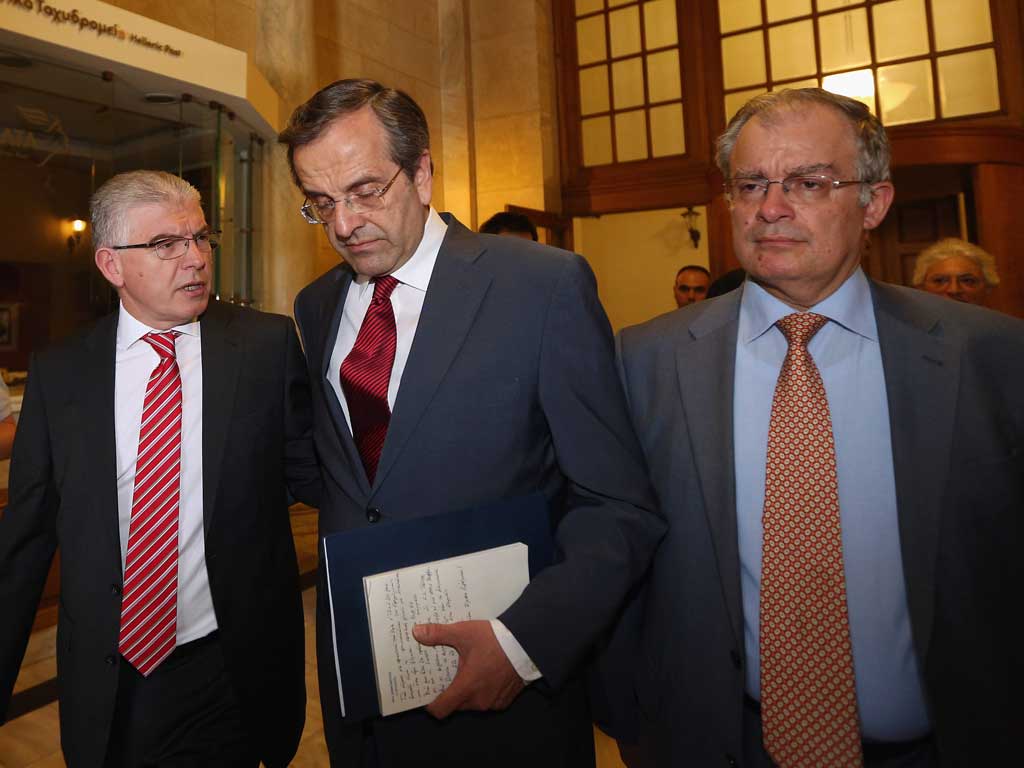Greek conservative leader Antonis Samaras calls for broad coalition

Europe looked on with wary relief as Greek conservative leader Antonis Samaras launched coalition talks after winning elections following weeks of uncertainty over whether the country could remain in the eurozone.
A Greek exit would have potentially catastrophic consequences for other ailing European nations and hurt the United States and the entire global economy as well.
European Union leaders appeared relieved that a pro-austerity government had a good chance of being formed.
"Continued fiscal and structural reforms are Greece's best guarantee to overcome the current economic and social challenges," European Council President Herman Van Rompuy and European Commission President Jose Manuel Barroso said in a joint statement.
But an early market rally faded quickly as investors turned their attention back to the other financially unstable economies in the eurozone - Spain and Italy.
In Athens, stocks lost initial strong gains but were still 4.5% up in afternoon trading.
Sunday's vote "will probably ease fears of an imminent Greek euro exit," said Martin Koehring of the Economist Intelligence Unit. "But the key question is how quickly can a government be formed?"
With 129 of Parliament's 300 seats, the conservative New Democracy party lacks enough MPs to govern alone, and must seek allies among the pro-bailout Socialists, who came third. Mr Samaras, who now has three days in which to build a coalition, said he wanted to form a government with long-term prospects.
"My position is that there must be a national salvation government with as many parties in it as possible," he said after talks with Alexis Tsipras, leader of the radical left Syriza party. "I will continue the effort because the country has an immediate need of being governed."
But Mr Tsipras, whose party came second on Sunday, quickly rejected the proposal to join a coalition.
"Our strategies are opposed," he said. Under the 37-year-old former student activist, Syriza campaigned on a pledge to scrap Greece's bailout commitments.
However the coalition deal that evaded Mr Samaras after an inconclusive election on May 6 looked more attainable. With the Socialists' backing he would control 162 seats, and could seek a further boost from the small Democratic Left party.
Meanwhile The head of Greece's socialist PASOK party says the country needs to form a government fast, and that negotiations for a coalition must be completed by the end of Tuesday.
Evangelos Venizelos, a former finance minister, said that the "broadest possible" consensus must be found between the parties.
The Democratic Left has opposed Greece's austerity programme but said it will do what is needed to help form a strong government.
On the streets of Athens, the mood was mixed, with many saying party leaders must get their act together.
"The election result isn't strong enough to put people's minds at ease," said sandwich shop owner Mary Moutafidis, 57. "They still have to agree to form a government."
Final results gave New Democracy 29.66%, followed by Syriza at 26.89%. The extreme far-right Golden Dawn party, whose members have been linked with violent attacks on immigrants, came fifth with 6.92%; it won 18 seats - down from the 21 it collected on May 6.
Greece has survived for more than two years on rescue loans from its European partners and the International Monetary Fund. The vital bailouts are conditional on the country continuing with its deeply unpopular package of spending cuts, and pushing through new structural reforms.
Athens has pledged to push through new savings, raise billions in company and property privatisations and sack about 150,000 civil servants.
Both New Democracy and the Socialists want an extension of at least two years to the austerity and reform deadline, to alleviate pressure on a population exhausted by two-and-a-half years of deep income cuts and tax hikes.
Unemployment has soared to more than 22%, while Greece's economy is in a fifth year of deep recession.
Join our commenting forum
Join thought-provoking conversations, follow other Independent readers and see their replies
Comments
Bookmark popover
Removed from bookmarks